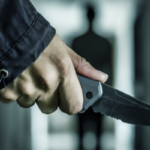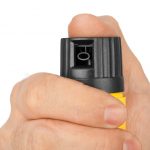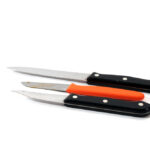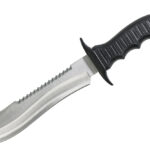The Laws Relating to Possessing a Knives, Pepper Spray and Tasers in NSW
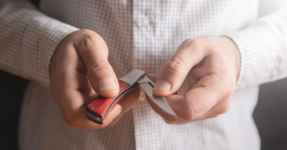
I was once on a road trip from Sydney to Melbourne, our bags were packed, heading down the Hume Highway right before Christmas.
I’m driving my dad’s Falcon and we were talking about our tickets to a summer cricket match. Somewhere along the trip, one of my friends in the backseat pulls out a small knife to show to the other boys.
I freak out at this point and say, ‘You can’t have that! It’s illegal’
‘No it isn’t.’
‘Yes. It is.’
We had a little argument about this until we later looked up the legislation on our phones.
He was a slightly taken aback at first, then a little embarrassed because he was a lawyer and didn’t know it was illegal (he shall remain nameless as with the others in this article).
‘Why do you have it?’
‘It’s just useful to have with you.’
He went into commercial law, so it was fair enough he didn’t know. But if he of all people didn’t know it was illegal, then how many others are out there that also don’t know?
A lot of people will ordinarily hold a gut feeling on whether it feels right or wrong to be carrying a knife, and if it feels wrong, they won’t do it.
But you’d be surprised to hear a lot of people get caught up in mishaps when it comes to carrying a knife. These mishaps usually end up in a court case where you’re having to defend yourself in the Local Court.
The current law
The laws on carrying a knife in public are governed by the Crimes Act 1900 (NSW), and to a lesser extent by the Weapons Prohibition Act 1998 (NSW).
A lot of people caught carrying a knife in public will often say they have it for self-defence, or for their own protection, ‘just in case’. Which may be understandable. A person may live in a dangerous neighbourhood and might need it.
But none of the above reasons count as lawful reasons to carry a knife under the Crimes Act 1900 (NSW).
This would provide little comfort to say a lady walking back home at night who finds herself being followed by a strange man through a park.
The only resort they would have to defend themselves is to use their own fists or hold tight onto their car keys in case the unthinkable happens.
How about ‘pepper spray’?
Oleoresin capsicum spray – also known as OC spray or pepper spray – is not legal to carry either.
That regard, section 7 of the Weapons Prohibition Act 1998 makes it an offence punishable by up to 14 years in prison to possess a prohibited weapon, which includes the substance.
To legally possess pepper spray, you are required to obtain a permit under the Weapons Prohibition Act 1998.
I personally don’t know anyone who has applied for a permit or heard of anyone coming out the other end of the permit process.
Pepper spray can also blow back into your own eyes if there’s a wind or breeze that blows the wrong way, which might not be the best way to ward off a would-be attacker.
Even with the best training, there are cases of police officers being injured by the deployment of their own OC spray.
Tasers also require a permit under the same legislation.
The idea of just holding a taser however, which can electrocute yourself with its blue arc, is scary and repellent to most people.
The legislation also requires you to establish a ‘genuine reason’ to obtain a permit for either the spray or taser, along with stringent storage requirements. This effectively means only security guards and police officers can hold a permit.
What is a ‘reasonable excuse’ to carry a knife?
The lawful reasons to carry a knife in public is set down under section 93IB of the Crimes Act 1900,
Under the Act, a ‘reasonable excuse’ exists if it was necessary to carry or use the knife for:
- The lawful pursuit of the person’s occupation, education or training, or
- The preparation or consumption of food or drink, or
- Participation in a lawful entertainment, recreation or sport, or
- The exhibition of knives for retail or other trade purposes, or
- An organised exhibition by knife collectors, or
- The wearing of an official uniform, or
- Genuine religious purposes, or
- During travel to or from or incidental to any of these activities.
Case studies
I once represented a homeless woman in court, who was experiencing a rough time after being kicked out of her partner’s house, who was charged.
She was let off with a caution the previous time she was found with a knife, but not the second time (as you cannot receive a caution for your second time).
Among her reasons for owning the knife was to prepare food as she has no kitchen. When asked repeatedly by police why she had the knife, she gave an additional answer that it was for her own protection in case she gets attacked.
This additional answer caused major headaches for her own legal defence in court.
Another time I represented a person who was coming back from buying drugs at night (he had a drug issue back then, but has since completed rehabilitation).
He worked as a diesel mechanic and bought a small curve-shaped knife from Super Cheap Auto earlier in the day, so he can keep it in his garage and use is to scrape gaskets when working on engines.
He gave evidence along with his father about his work and occupation, alongside other evidence of the knife itself.
The court however applied a narrow interpretation of what is ‘reasonably necessary and incidental to travel’ for one of the reasonable excuses and the court later found against him. His father was furious after court – he managed to speak to a producer at A Current Affair to try to get a story done, how unfair it was and how little public information there is on cases like this.
Another time I represented a person who was taking the train across Sydney to meet up with his friends and go fishing. He had a backpack with a fishing reel and a small tackle box inside.
While waiting at the station, he saw an Antifa sticker on a light pole that he didn’t like. He pulled out a large hunting knife from his backpack and scraped off the sticker.
At that moment a passenger on a passing train saw him with the hunting knife, was scared he was going to board the train and called emergency services.
My client was very worried this would go onto his criminal record, he’d never committed a criminal offence before, was young, about to finish his university studies, and had no idea what he was doing is illegal.
He’d earlier bought the knife from a recreational store. He thought it was legal to carry as long as it was in a sheath (as told to him by a store clerk).
Towards the hearing we were preparing a defence of reasonable excuse for lawful fishing and recreational activity.
As we’re preparing, it turned out our client also sent a flurry of emails to the officer asking for his ‘lemon knife’ back.
When I asked him about it, he told me he likes eating lemons, as strange as that is, and he was in fact was seen eating a raw cut up lemon on the platform.
He told the arriving officers too about the lemons. He was found not guilty after a contested hearing. Unfortunately for him, he forgot to ask police for the lemon knife back and it was destroyed as per police protocol.
Another time I represented a young eighteen-year old Iranian man who was a refugee to this country. He was working nighttime at a chicken shop to help pay his way through studies and needed help appealing a licence suspension.
As he came into court through the metal detectors, he was asked to step aside in the line. In his wallet, there was a plastic card that has a tiny swivel blade in the corner.
He’d bought it off Amazon and thought it was handy to keep in his wallet in case he needed it.
He didn’t think of it as a knife and forgot it was there. But growing up, in Iran carrying tools like this was normal to get by. In context, it was treated very seriously by the police, bringing a knife directly into a courthouse.
Though in reality, the blade was flimsy and was more likely to break apart in his wallet.
After I sat next to him during his interview in the lobby of the police station, he was given another new court date for the knife offence.
This is not to say knife crime is not serious.
Carrying a knife can have horrible consequences, even if you don’t intend on actually using it when packing it away in your bag.
Going to court for a knife or weapons offence?
If you have been accused of possessing a knife in a public place, or possessing a prohibited weapon such as pepper spray or a taser, call Sydney Criminal Lawyers anytime on (02) 9261 8881 to arrange a free first conference and let us fight to produce the best possible outcome, so you can put the episode behind you and move forward with your life.

